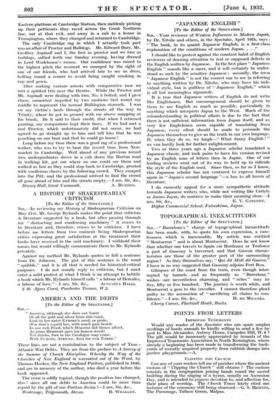"JAPANESE ENGLISH " [To the Editor of the SPECTATOR.] Sin,—Your
reviewer of Western Influences in Modern Japan, by Dr. Nitobe and others, in the Spectator, April 16th, says : " The book, in its quaint Japanese English, is a first-class explanation of the conditions of modern Japan. . . ."
I should like to protest against the constant habit of English reviewers of drawing attention to real or supposed defects in the English written by Japanese. In the first place " Japanese English " sounds like a sneer, and it will certainly be under- stood as such by the sensitive Japanese ; secondly, the term " Japanese English " is not the correct one to use in referring to anything written by Dr. Nitobe, who may have his indi- vidual style, but is guiltless of " Japanese English," which is all but meaningless rigmarole.
It is true that Japanese writers of English do not write like Englishmen. But encouragement should be given to
them to use English as much as possible, particularly in anything which interprets Japan to the West. Much of the misunderstanding in political affairs is due to the fact that there is not sufficient information from Japan itself, and as very few Englishmen seem capable of translating from Japanese, every effort should be made to persuade the Japanese themselves to give us the truth in our own language. If, when they do so, we laugh—" What funny English !" we can hardly look for further enlightenment.
Two or three years ago a Japanese scholar translated a Japanese classic, and took pains to have his version revised by an English man of letters then in Japan. One of our leading reviews went out of its way to hold up to ridicule the style of the English used. Since then, so far as I know, this Japanese scholar has not ventured to express himself again in " Japan's second language "—a loss to all lovers of literature.
I do earnestly appeal for a more sympathetic attitude towards Japanese writers who, while not writing like Carlyle or James Joyce, do contrive to make their meaning clear.—I




































 Previous page
Previous page